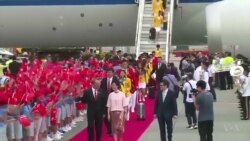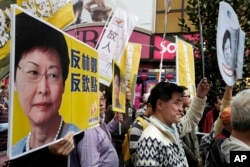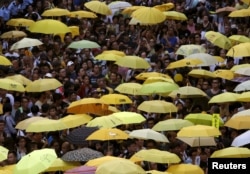On March 26 in Hong Kong, an electoral committee of nearly 1,200 people, stacked with Beijing loyalists, will select the city's chief executive for the next five years.
The race is widely seen as a competition between China's preferred candidate, Carrie Lam, and the more popular John Tsang.
While most believe Lam is virtually guaranteed to win with Beijing's support, questions linger about how divided the electoral committee vote will be and what impact the results might have on calls for political reforms from the city's youth and pan-democrats.
Lingering nostalgia
It's been 20 years since the British handover of Hong Kong to China, and the former colony remains a vibrant mix of East and West, a port city that dances to the beat of its own drum.
Double-deck trams and buses ply narrow streets as the pungent smell of dried seafood fills the air. Horse racing, a holdover in this former British colony, is still popular.
The race for chief executive, however, is one competition many hoped would be different.
Dashed hopes
2017 was originally the year Hong Kong might be allowed to directly elect its top leader.
Instead, China's political grip has tightened and there is a growing disconnect with the city's communist rulers in Beijing.
Young people, in particular, are upset about stalled political reforms.
Trian Kong, a 24-year-old dance instructor, said when she was younger, she was excited to know that she would be able to cast her vote in the chief executive election every five years.
Knowing the option is no longer available, she says she has grown indifferent to the city's politics.
"I have no rights to vote, and there's nothing I can do about it," Kong told VOA.
Another 21-year-old performing artist shares Kong's frustration.
"People like us, citizens like us, don't have any right to speak out. Even though we speak out, it doesn't change a lot," said Michael Wong.
Both said they are not hostile to China, but hoped for freer elections, which won't be rigged by the authorities or controlled by the rich and the powerful.
Status quo
What the public wants for its young and old isn't much more than what they have now. That is, the rule of law and economic prosperity, as well as "one person, one vote" for its top leader, who they hope will look after the interests of this city's 7 million residents.
The failure of the incumbent chief C.Y. Leung to promote greater democracy and freedoms triggered the massive months-long Occupy Central campaign. Commonly known as the Umbrella Movement, it protested China's decision in 2014 to pre-screen the city's chief executive candidates in a proposed popular vote.
The disappearance of booksellers in late 2015 fueled already growing fears the "one country, two systems" formula, enacted by China, was turning into "one country, one system."
Denied political participation, the city's pro-democracy activists say they are not afraid to show defiance again if Beijing continues to ignore the true voice of Hong Kong.
Core values
"The Chinese government is trying very hard to combat any democratization movement," said Yvonne Leung, former president of the Hong Kong University Students' Union.
"But I believe it is very important for Hong Kong people to uphold their core values, because the more aggressive the Chinese government are, the more people will be affected," she added.
Leung was among those student leaders during the Occupy Central campaign.
She disagreed with the views of tycoon Li Ka-shing, who told reporters on Thursday that the city needs to put its collaboration with Beijing before local sentiments.
Yet, for now, China is likely to get its way.
Observers say Beijing's hand-picked candidate, Carrie Lam, is expected to claim a majority of the votes, outperforming the former finance secretary rival John Tsang, whose pan-democrat supporters account for only one-fourth of the votes.
Political unrest
But the election is not likely to signal an end to political unrest, analysts say.
According to Dixon Sing, associate professor of the Hong Kong University of Science and Technology's social science division, because of the city's "mini-circle" electoral system, its democratic forces have been torn apart by realists and idealists — a source for their continued disunity.
"The divisions will continue, but then it is also a matter of making compromises, including respecting mainstream public opinions," Sing added.








